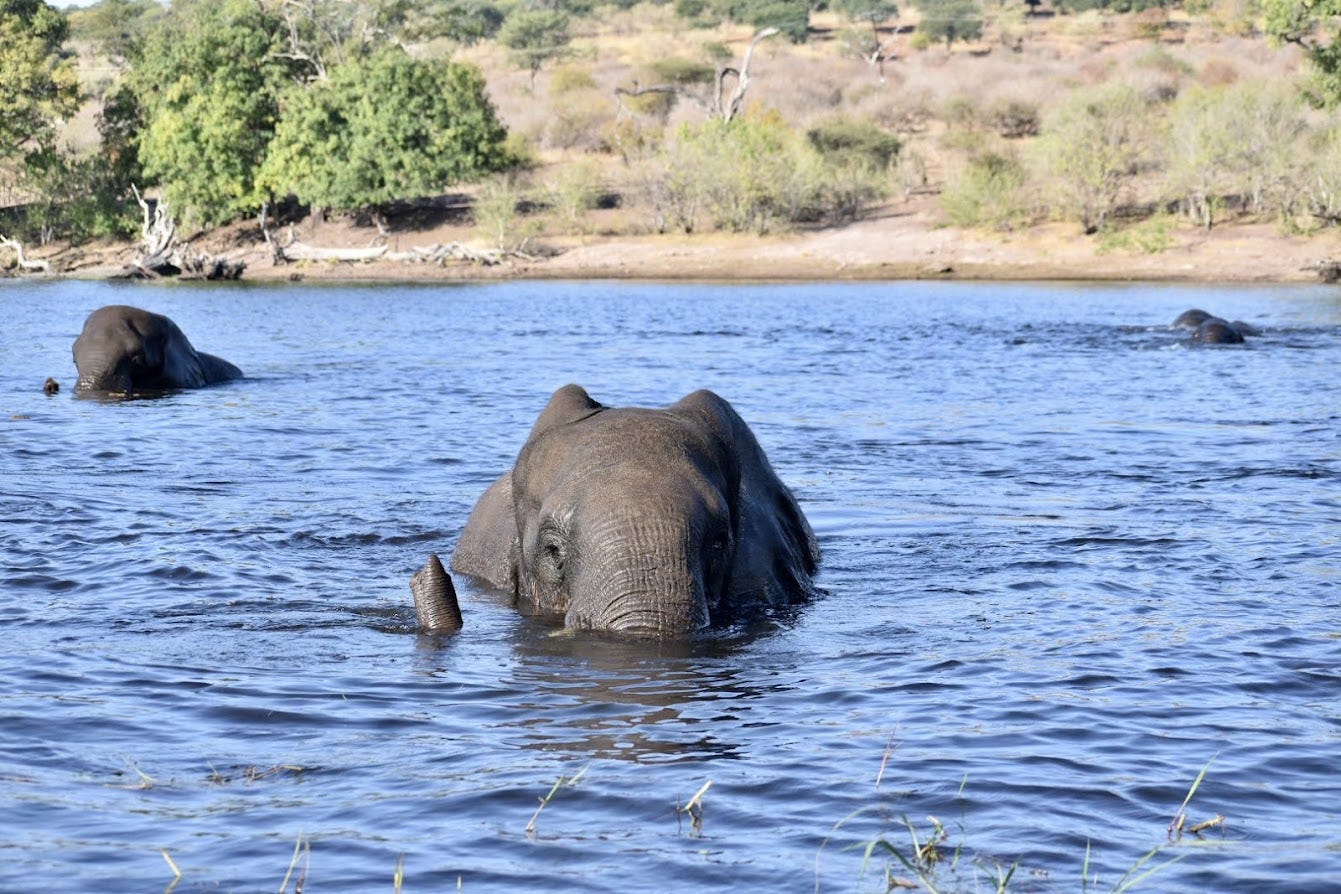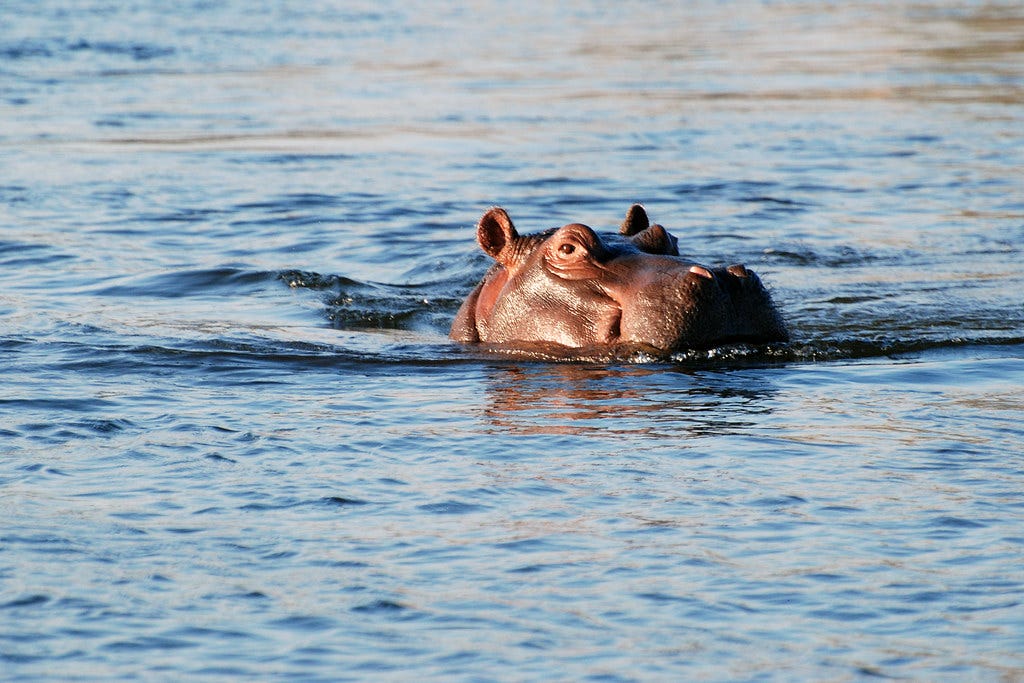Absolute Harmony
What the Elephants Taught Me
“Every wild thing is in tune with its surroundings, awake to its fate, and in absolute harmony with the planet. Their attention is focused totally outwards. Humans, on the other hand,
tend to focus introspectively on their own lives too often, brooding, and magnifying problems that the animal kingdom would not waste a millisecond of energy upon.”
– Lawrence Anthony, the Elephant Whisperer
Dark gray heads were bobbing up and down making their way from the shore to the flats in the middle of the Zambezi River. A large elephant was leading the herd, and the rest were swimming in a line behind her. Except the youngest elephants who were swimming upstream of the larger ones to keep from being swept away by the current. They were surprisingly good swimmers, using their trunks like a snorkel to breathe in the deepest part of the river.
We were in Botswana on a safari guided tour hoping to see wildlife congregating along the river to drink and find food. Taking this trip with our daughters was a dream for me and my husband. With his cancer diagnosis, we began proactively taking trips and doing things that were previously sitting on our bucket list. In fact, we decided that there wouldn’t be a bucket list anymore. Only making memories in the here and now mattered.
“Why do you think they are swimming in the river?” our safari guide asked.
“Food,” my daughter answered.
“Yes, they are looking for food. Right now, grass is growing in the shallow areas in the middle of the Zambezi. There is not as much food on the shore. They will graze here most of the day and then return to the shore by dusk,” he said.
Our guide was a member of the Tswana tribe and one of the most senior and respected guides in the Chobe National Park. He spoke fluent English, Setswana, Shona, and Kalanga. Speaking at least three languages fluently was common in Botswana. And his knowledge of the animals and birds in the region seemed endless.
The Zambezi was as wide as any river I had ever seen, likely more than a mile wide in this location. We had set out at dawn in a small motorboat and were now within 25 feet of the elephants slowly climbing out of the river. The elephants started on the shores of Botswana within the Chobe National Park. The country of Namibia was on the opposite shore.
The matriarch began to emerge. First, only the dome of her head and the tip of her trunk were visible. Then her large head and both ears surfaced. Water poured off her thousand-pound body as she climbed slowly out of the river. So slowly and gracefully. Within a minute, she began pulling on grass that was growing in the floodplain.
“Watch what she is doing. She is using her trunk to pull the grass up from its roots,” our guide said. “Then, she washes the grass in the river to remove the dirt. This helps to save her teeth from erosion.”
After pulling up a tuft of grass with her trunk, she began dragging it through the water in a looping motion, back and forth, with a final slapping of the grass on the water’s surface. The slapping was rhythmic in a way and as the elephant herd on the floodplains grew, the slapping sounds began coming from many directions at once. They were oblivious to us.
“They only have six rows of teeth, and each row lasts about ten years. When they lose their last set of teeth, it becomes hard for them to eat and survive. Washing the grass in the water is important.”
Nature hadn’t designed elephants to outlive their teeth, and most would die of starvation when their last set of teeth had worn out. How did the elephants know that washing the grass would save their teeth? I wondered.
“Have you ever encountered poachers?” I asked the guide. Poaching to obtain their ivory tusks was a more imminent danger to the elephants. Botswana had struggled to contain the poaching for many years. In response, they developed anti-poaching units, who had a “shoot-to-kill” policy of suspected poachers. The policy was controversial and had resulted in killings of people on both sides of the river, including Namibians.
“Not really. Once, we found a dead waterbuck that had been shot, likely for food by a local. I called the anti-poaching unit to let them know. Poaching is bad for business. No one wants that,” he said meaning that tourism was the business of Botswana. A thriving poaching industry and ecotourism could not coexist.
“What about crocodiles? Would a crocodile kill an elephant?” asked my daughter.
“No,” the guide laughed. “They prefer fish and buffalo. But if a small calf is in the wrong place at the wrong time, it’s possible. Anything is possible.”
I looked over at my husband, who was enjoying the scenery. My gaze had for too long been on the future and whether his cancer would return, and what that might mean for our family. A lot of worrying and anxiety about a future that may or may not come to pass. What had all this worrying done for me? I thought. Nothing. Other than cause me misery.
The elephants weren’t worrying about the real and present dangers in their environment. The herd was focused on pulling up grass, cleaning it in the water, eating it, and staying together as a group on the floodplains. There was a mesmerizing beauty about seeing these animals in their natural habitat. They were in absolute harmony with nature and each other. If there were dangers that might befall them later that day from poachers or crocodiles, they weren’t concerned.
I saw the guide looking over his shoulder intently. I took a pair of binoculars so that I could magnify what he was seeing. I could see the top of a small gray and wrinkled head about 30 feet away from us. Then, the head submerged. A hippopotamus.
“Never trust a hippo in deep water,” he said. He started the engine and began to maneuver the boat to put more distance between us and the hippo. Within 15 seconds, the hippo surfaced much closer to us breaking the surface of the water with a big splash.
“See what I mean,” said the guide. “Never trust a hippo,” he chuckled. “We should start heading back to catch the sunset.” He started the motor and began maneuvering the boat slowly away from the herd of elephants grazing on the floodplains.
Looking back at the elephants one last time, I reached for my husband’s hand. The elephants were in absolute harmony with nature. Honoring the present moment and keeping one’s energy focused on the here and now was a mighty lesson taught by these majestic creatures. Now, the trick was to live my life in the present and not the future.






